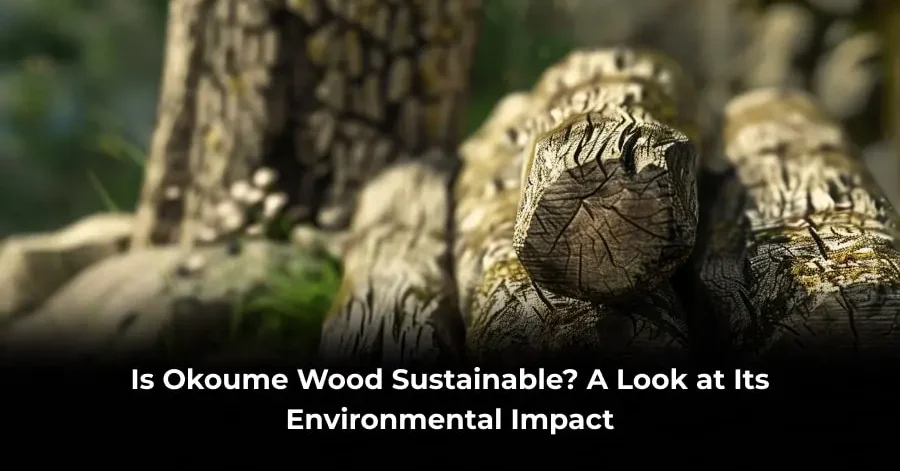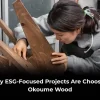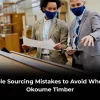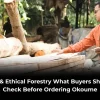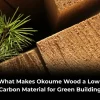When you’re planning a project that calls for beautiful, workable wood, it’s natural to think about its origin. The choices we make have ripples, and for woodworkers, boat builders, and designers, the question of sustainability is paramount. One species that often sparks this conversation is Okoume wood. Known for its stunning pinkish hue and exceptional versatility, it’s a favorite for everything from marine plywood to fine veneers. But where does it come from, and at what cost to the rainforests?
This isn’t just a question for environmentalists; it’s a crucial consideration for anyone who sources materials. As conscientious consumers and businesses, from individual craftsmen to large-scale hardwood timber suppliers, we have a responsibility to look beyond the grain. Let’s peel back the layers on this remarkable African hardwood and explore the complex reality of its environmental footprint.
Getting to Know the Tree: What is Okoume Wood?
Scientifically known as Aucoumea klaineana, the Okoume tree is a giant of the Gabonese rainforest. It’s a fast-growing hardwood, which immediately sets it apart from slow-growing species like Teak or Mahogany. This rapid growth cycle is a key factor in the sustainability discussion. The wood itself is a dream to work with: it’s lightweight, has a straight grain, and finishes beautifully. Its most famous application is in the marine industry, where it’s laminated into the incredibly strong and stable Okoume wood panels used for boat hulls and decks. It’s also prized for cabinetry, millwork, and its exquisite veneer.
But its popularity is a double-edged sword. High demand can lead to intense pressure on the forests where it grows. So, how do we balance our need for this fantastic material with the health of its ecosystem?
The Heart of the Matter: Is Okoume Wood Sustainable?
The answer is not a simple “yes” or “no.” It’s a nuanced “it depends.” The sustainability of any Okoume wood harvest hinges entirely on the forestry practices and governance in the region where it’s logged.
The Case for Sustainability:
- Fast Growth: As mentioned, Okoume trees reach maturity much faster than traditional hardwoods. This means that, in theory, a well-managed forest can be regenerated and harvested cyclically without complete depletion. Responsible hardwood timber suppliers often highlight this characteristic.
- Certification Programs: This is the most critical factor. The presence of robust certification systems like the Forest Stewardship Council (FSC) can make all the difference. FSC-certified Okoume wood comes from forests that are managed to high environmental and social standards. This includes protecting biodiversity, respecting the rights of local communities, and ensuring long-term forest health. When you buy FSC-certified material, you are directly supporting sustainable forestry.
- Selective Logging: In a well-managed system, loggers don’t clear-cut vast swathes of land. Instead, they use selective logging, carefully choosing only a few mature trees per hectare. This minimizes the impact on the surrounding forest structure and allows the ecosystem to recover.
The Environmental Concerns:
- Deforestation and Habitat Loss: The primary concern in Central Africa, including Gabon and the Republic of the Congo (the natural range of Okoume), is deforestation driven by agricultural expansion and, to a lesser extent, illegal logging. Unsustainable logging practices can fragment forests, destroy wildlife habitats, and threaten biodiversity.
- Weak Governance: In regions where forest law enforcement is weak, illegal logging can flourish. This unregulated harvest completely bypasses any sustainability measures and is a significant threat.
- Carbon Emissions: Forests are vital carbon sinks. When they are degraded or cleared, not only is their carbon storage capacity lost, but the carbon stored in the trees is released into the atmosphere, contributing to climate change.
So, the key takeaway is this: Okoume can be a sustainable choice, but only if it is sourced responsibly. The burden falls on both the hardwood timber suppliers to provide verified, certified wood and on us, the consumers, to demand it.
The Role of the Wood Grading System in Quality and Waste
An often-overlooked aspect of sustainability is efficiency and waste reduction. This is where a reliable wood grading system proves invaluable. A precise wood grading system sorts lumber based on its appearance and structural characteristics. For a material like Okoume wood, which is often used for visible surfaces in plywood and veneers, grading ensures that the right piece of wood is used for the right job.
How does this relate to sustainability?
- Reduces Waste: A clear wood grading system allows manufacturers to minimize waste. A lower-grade piece with more knots can be used for structural, unseen layers of plywood, while the clear, high-grade veneers are reserved for top surfaces. This efficient use of every log means less wood is needed overall to produce the same amount of usable product.
- Ensures Longevity: Properly graded wood leads to better-performing end products. A boat hull made with correctly graded marine plywood will last longer and not need replacement as soon, reducing the long-term demand for raw materials.
When hardwood timber suppliers adhere to a strict wood grading system, they are not just ensuring quality; they are practicing a form of sustainability by maximizing the utility of every single tree harvested.
Making the Responsible Choice: What to Look For
As a buyer, your power lies in your purchasing decisions. Here’s how you can ensure the Okoume wood you’re using aligns with your environmental values:
- Demand Certification: Always look for the FSC label. This is the most straightforward way to know the wood was sourced responsibly. Don’t hesitate to ask your hardwood timber suppliers for their chain of custody certification.
- Ask Questions: Where does the wood come from? What are the logging practices of the company that harvested it? Reputable suppliers will be transparent about their sources.
- Consider the Application: Is this the best wood for the job? For some projects, a locally sourced, fast-growing species might be a more sustainable option than an imported tropical hardwood, even a potentially sustainable one like Okoume.
Also Read: How to Finish Okoume Plywood: A Step-by-Step Guide for Maximum Protection
AEW Wood: A Case Study in Responsible Sourcing
In a market where provenance is everything, it’s encouraging to see companies built on a foundation of sustainability and transparency. One such example is AEW Wood.
AEW Wood has established itself as a leading supplier of premium marine plywoods and Okoume wood products, with a strong commitment to ethical and environmentally sound practices. They understand that the longevity of their business is intrinsically linked to the health of the forests. By prioritizing FSC-certified sources and maintaining a rigorous wood grading system, AEW Wood ensures that their customers receive not only a superior product but also a clear conscience.
Choosing a supplier like AEW Wood means you are partnering with a company that looks at the bigger picture. They represent a model for how hardwood timber suppliers can operate successfully while being stewards of the environment, proving that quality and responsibility can go hand-in-hand.
Conclusion
The journey of a piece of Okoume wood from a Central African rainforest to your workshop is a complex one, laden with both promise and peril. Its sustainability is not an inherent trait but a consequence of conscious choice. The story of Okoume wood teaches us that sustainability is a chain, linking the forestry management in Gabon, the ethical practices of hardwood timber suppliers, the precision of the wood grading system, and finally, the informed decision of the end user.
By insisting on certification, supporting transparent companies like AEW Wood, and understanding the full lifecycle of our materials, we can all be part of a solution that allows us to enjoy the beauty and utility of woods like Okoume without costing the Earth. The grain of the wood tells a story; let’s make sure it’s one we can be proud of.
Frequently Asked Questions (FAQs)
- Is Okoume wood waterproof?
While Okoume wood itself is not naturally waterproof like Teak, it has excellent moisture resistance when properly sealed and finished. Its primary use is in marine-grade plywood, where the laminated layers are bonded with waterproof adhesives, making the final panel highly resistant to rot and moisture, perfect for boat building. - How does the wood grading system affect the price of Okoume plywood?
The wood grading system directly impacts price. A higher grade (e.g., “A-A” or “A-B” face veneers) indicates a clear, virtually knot-free surface, which is more desirable for visible finishes and thus commands a higher price. Lower grades are perfectly sound structurally but are more economical, as they may have patches or small knots. - Can I buy FSC-certified Okoume wood easily?
Yes, the availability of FSC-certified Okoume wood has increased significantly. Most reputable hardwood timber suppliers, especially those specializing in marine and premium woods, will stock or be able to order FSC-certified products. It may come at a slight premium, but it guarantees sustainable sourcing. - How does Okoume wood compare to Mahogany for a project?
Okoume wood is lighter and less dense than genuine Mahogany, making it easier to work with for large panels. It has a similar, though often lighter and more pinkish, color. While Mahogany is generally harder and more durable, Okoume wood offers an excellent strength-to-weight ratio and is often more cost-effective, especially in plywood form. - Are there any alternatives to Okoume wood that are sustainable?
Yes, several alternatives exist. For marine applications, Meranti is another tropical hardwood used in plywood, though its sustainability varies similarly. For non-marine uses, consider FSC-certified Western Red Cedar or, for a dramatic look, thermally modified Ash or Poplar, which are locally sourced in North America and Europe and have enhanced durability.

